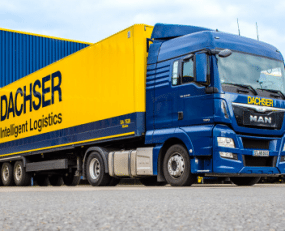
DACHSER increased its consolidated net revenue by a solid 1.6% to €5.66bn. The logistics provider continued to grow in 2019, despite the global economy becoming increasingly weaker.
Driving this growth was again the Road Logistics business field, net revenue rose by 2.9% to €4.60bn. The Business Line European Logistics contributed €3.63bn (+2.4%) to the Road Logistics revenue. “Cross-border services remained strong and contract logistics saw positive development throughout Europe. Although the situation on the freight market relaxed in the course of 2019, the shortage of drivers and lack of qualified personnel in Germany and many other European countries continues to be our most pressing challenge.” Bernhard Simon, CEO, explained.
In contrast, the Air & Sea Logistics business field saw a decline of 4.1%, mainly attributable to weaker demand for air freight services for automotive customers. In 2019, DACHSER took steps to future-proof this business field. These included adding the life sciences/pharmaceutical and fashion & sports sectors to its customer portfolio and expanding rail services along the New Silk Road. Air and sea transports, particularly for LCL, were connected more tightly with the European overland transport network. In addition, the rollout of DACHSER’s Othello transport management system, developed in-house, is now essentially complete. “In Air and Sea Logistics, we’re feeling the effects of the business climate, which is very volatile and greatly impacted by the disruptions to world trade. In our air freight business, the effects of the weak demand for transport services from the German automotive industry are particularly evident.” Simon continued.
DACHSER’s Food Logistics business line achieved the strongest growth in 2019, recording revenue growth of 5.1% from €917 to €964m. The number of shipments handled declined by 1.7% and tonnage saw a slight rise of 0.6%.
Due to the COVID-19 outbreak, DACHSER, like many companies, will have to readjust its targets. It had planned to expand transit terminals and warehouses and invest in IT systems and technical equipment. Simon explained, “The final impact on our business is difficult to predict; all we can do is reassess the situation daily and respond accordingly, taking an agile and flexible approach. In view of the current restrictions on business activities, we can’t avoid a downturn in volume in our industrial goods business, especially in Spain and France. However, in terms of our service portfolio and customer structure, we deliberately adopt a very broad position so that we can adapt well to new scenarios. As a logistics provider, we are a key link in the basic supply chain for the food sector, and we expect this business to remain relatively stable.”
Source: DACHSER